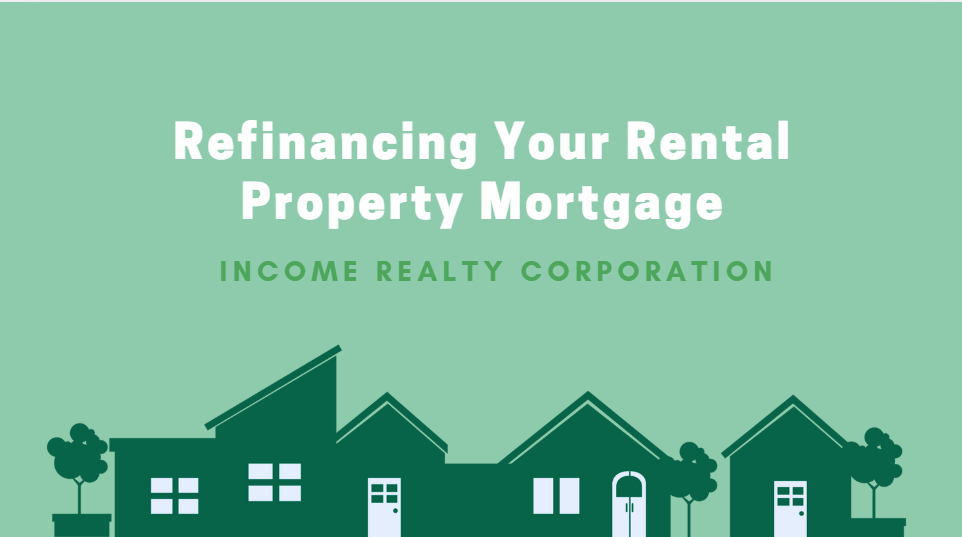Key Takeaways:
Refinancing a rental property can significantly improve cash flow, reduce expenses, or unlock equity for further investment, but it involves more stringent requirements than refinancing a primary residence.
To determine if refinancing makes sense, property owners should evaluate current interest rates, equity levels, property appreciation, and their long-term investment plans.
Partnering with a property management company can streamline the refinancing process by ensuring strong documentation, consistent occupancy, and valuable market insight.
Refinancing a rental property mortgage is one of the most powerful strategies rental property owners can use to increase cash flow, reduce long-term expenses, or even grow their portfolio.
The following guide by Income Realty Corporation provides an overview of everything you need to know about refining your rental property mortgage.
While the idea may sound similar to refinancing a personal home, there are key differences and important considerations specific to investment properties.
What Is Refinancing?
In simple terms, refinancing means replacing your current mortgage with a new one. This could involve getting a better interest rate, switching from an adjustable to a fixed-rate mortgage, shortening or extending the loan term, or pulling out cash through a cash-out refinance. The overall aim is to improve the financial performance of your rental property.
Why Refinance Your Rental Property?
There are several compelling reasons rental property owners consider refinancing:
To Lower Interest Rates
Interest rates fluctuate over time. If you secured your mortgage several years ago and rates have since dropped, refinancing could result in a lower monthly payment. Even a small decrease in your interest rate can yield substantial savings over the life of the loan.
To Increase Monthly Cash Flow
By refinancing into a loan with a lower interest rate or a longer term, you can reduce your monthly payment. This increases your net cash flow, giving you more breathing room to handle maintenance costs, cover vacancies, or reinvest in your business.

To Tap Into Home Equity
Many investors use a cash-out refinance to extract equity from a property and use it for funding renovations, paying off high-interest debt, or buying additional properties. This strategy allows you to make your equity work for you instead of letting it sit unused.
To Change the Loan Structure
Maybe you’re currently on an adjustable-rate mortgage and want the stability of a fixed rate. Or perhaps you want to shorten the term of the loan to pay it off faster. Refinancing can provide options that better suit your current financial goals.
Is Refinancing Right for You?
Before jumping into a refinance, it’s essential to assess whether it’s the right move based on your specific situation. Ask yourself the following:
● Has your property appreciated in value since you purchased it?
● Do you have at least 25% equity in the home?
● Has your credit score improved since you first got the loan?
● Are interest rates currently lower than when you first financed?
● Are you planning to keep the property long enough to recover the cost of refinancing?
If you answered “yes” to most of these, refinancing may be a smart option.
What Lenders Look For
Refinancing an investment property usually involves stricter requirements than refinancing a primary residence. Here are the key factors lenders evaluate:
Loan-to-Value Ratio (LTV)
Most lenders require a lower loan-to-value ratio for investment properties than they do for primary homes. Typically, you’ll need at least 25% equity, though some lenders may allow 20% under specific conditions.

Credit Score
Lenders want to see strong credit for investment property refinancing. While 620 might be the minimum threshold, having a score of 700 or higher will qualify you for better interest rates.
Debt-to-Income Ratio (DTI)
Your DTI helps lenders assess whether you can comfortably afford your debt obligations. A DTI of 43% or lower is generally required for refinancing approval.
Rental Income
Many lenders will consider the income generated from the rental property when calculating your ability to repay. Be prepared to provide documentation such as signed leases and rent rolls.
The Refinancing Process
Here’s what you can expect when refinancing your rental property:
Review your goals: Are you looking to lower your payment, take cash out, or switch to a different loan structure?
Shop around for lenders: Different lenders offer different terms. Get multiple quotes to compare.
Prepare your documents: Gather financial statements, tax returns, lease agreements, and insurance policies.
Get an appraisal: Your lender will order an appraisal to determine the property’s current market value.
Undergo underwriting: The lender will review your financials, property performance, and credit history.
Close the loan: If approved, you’ll sign new loan documents and pay any closing costs.
Closing costs for refinancing typically range from 2% to 5% of the loan amount, so you’ll need to calculate whether the benefits outweigh the upfront costs.
Types of Refinancing Options
Here are refinancing structures available to rental property owners:
1. Rate-and-Term Refinance
This option allows you to change your mortgage interest rate and/or loan term without taking cash out. It’s ideal if you simply want to lower your monthly payments or lock in a fixed rate.

2. Cash-Out Refinance
A cash-out refinance lets you take out a new mortgage for more than what you currently owe and pocket the difference. This can be an excellent strategy if your property has appreciated and you want to invest elsewhere.
Common Refinancing Challenges
While refinancing can be beneficial, it’s not without its hurdles. Some potential challenges include stricter lending standards, higher interest rates, vacancy risk, and closing costs.
It’s important to weigh the cost of refinancing against the long-term benefits. Use a refinance calculator or consult with a mortgage broker to run the numbers.
How a Property Management Company Can Help
Refinancing is a numbers game, and having a professional property management company on your side can make the process smoother and more successful.
Here’s how they can help:
Organized Financial Records
Property managers maintain accurate financial statements, lease records, and maintenance histories. These documents are critical when applying for a refinance, as lenders will want to see consistent income and responsible management.
Better Property Condition
Well-managed properties tend to appraise higher due to routine upkeep and timely repairs. A strong appraisal can lead to better loan terms or allow you to tap into more equity.
Advisory Support
Property managers often have local market expertise. They can help you determine whether refinancing is right based on your property's performance and market trends. Their insight could save you time and money—and point you toward opportunities you hadn’t considered.

Consistent Occupancy
Professional management ensures your property remains occupied by reliable residents. This stability translates to reliable cash flow, which strengthens your loan application.
Final Thoughts
Refinancing a rental property mortgage can be a strategic financial move that opens the door to lower monthly costs, expanded investment opportunities, or improved cash flow.
However, it’s essential to understand the process, prepare thoroughly, and evaluate the numbers before making a decision.
If you're looking to optimize your portfolio, refinancing could be your next smart move—especially when supported by expert guidance every step of the way. If you have questions, reach out to our team at Income Realty Corporation.






